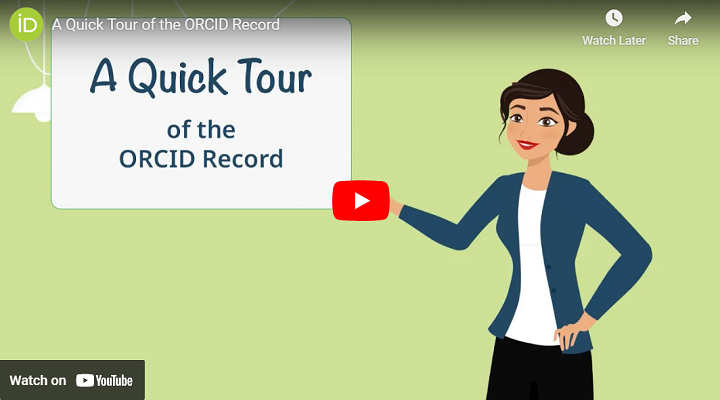ORCiD
A unique identifier to link researchers to their research outputs across systems and platforms.
What is an ORCID iD?
ORCID (Open Researcher and Contributor ID) provide a free, unique digital identifier to unambiguously link researchers to their grants, publications and datasets. Research funders, publishers and the university actively support the use of ORCiD iDs in research systems to assert these connections and allow the exchange of data.
Why register for an ORCID iD?
- ensures accurate attribution for your publications
- improves the discoverability of your research
- reduces administration when reporting on your research
- required by an increasing number of funders and publishers
- your ORCID iD belongs to you and stays with you if you move institution or change name
- over 5 million researchers already have an ORCID iD
- free and simple to register
Who should get an ORCID iD?
Anyone involved in research, scholarship, or innovation should have an ORCiD iD. This includes:
- Researchers and academics at all career stages—from students and early career researchers to senior academics.
- Postgraduate research students, especially those submitting theses or publishing.
- Professional staff involved in research support, grant applications, or scholarly communications.
- Authors and contributors to scholarly publications, datasets, software, or other research outputs.
Get your ORCID iD
Registering for an ORCID iD is simple and takes less than a minute. You can register for an ORCID iD via MyImpact, which will automatically connect the two systems (providing you are logged in to MyImpact.) Once you have done this your ORCID iD will also be shown on your publications in ePrints.
Alternatively, you can Register on the ORCID website directly and select which systems to link your account to.
Top tips for setting up an ORCID iD:
- Add at least two email addresses to your ORCID account. Use your personal email as the primary contact and your Newcastle University email as the secondary. This ensures you retain access to your account even if you change institutions, helping you maintain continuity in your research profile.
- Set your ORCiD visibility to “Everyone” to maximise its impact. While you have full control over your data permissions, the main goal of having an ORCiD is to enhance your research visibility. Choosing the “Everyone” option ensures your profile is discoverable and can be fully utilised by collaborators, institutions, and systems that support research visibility.
- Add your employment affiliation. Adding a current employment affiliation helps distinguish you from other researchers with a similar name.
- Do not create more than one ORCID iD. Having multiple ORCiD accounts can lead to confusion, fragmented records, and missed opportunities for recognition. Stick to a single iD to ensure your research outputs are accurately linked and easily discoverable. If you can not remember your ORCiD account details, go to Sign in - ORCID and click on the option ‘Forgot your password or ORCID ID?’
ORCiD is relatively easy to use and maintain after the initial setting of your account…I like it more than LinkedIn as it is tailored for scientists/researchers.
How to use your ORCID at Newcastle University
- Link your ORCiD to your MyImpact profile: This will enhance the visibility of your publications and ensure accurate attribution. Link your ORCiD to your MyImpact profile by following these short video instructions here.There is the option to click on read transcript or closed captions (cc)
- Accept the affiliation request from Newcastle University on your ORCiD account: This confirms your employment details and links your work to the University. Log in to your ORCiD account and accept the affiliation request from Newcastle University by following the short video instructions here. There is the option to click on read transcript or closed captions (cc). If you have not received an affiliation request within 3 months of your start date, please email res.policy@ncl.ac.uk.
- Set up/review your profile in Scopus: Ensure your author profile is correctly configured and your ORCiD is linked, see the step-by-step instructions. We have also created a longer how-to guide to help you with Scopus with general tips, including a 10 minute video, which you can find here. There is the option to click on read transcript or closed captions (cc).
Further guidance is available in the ORCiD Requests FAQs.
Where to use your ORCID iD
You can use your ORCID iD when submitting publications to many publishers (for example, Wiley, Springer Nature, IEEE and the American Chemica Society), when making grant applications to funders such as the Wellcome Trust and NIHR, when reporting on these grants in ResearchFish and in university research systems including MyImpact, ePrints and data.ncl.
By authorising these research systems to manage you ORCID profile it can be automatically updated with details of your new grants, publications and datasets.
Please note MyImpact is not currently able to import publications from ORCID.
ORCID made it easy to find all the DOIs of my papers which it automatically keeps up to date. I also appreciate being able to use my ORCID iD to sign into journal websites rather than having a new login for every journal I review or publish with.
Who are ORCID?
ORCiD, which stands for Open Researcher and Contributor ID, is a global, not-for-profit organisation sustained by fees from member organizations. They are community-built and governed by a Board of Directors representative of membership with wide stakeholder representation. ORCiD is supported by a dedicated and knowledgeable professional staff.
Established in 2012 their mission is:
To enable transparent and trustworthy connections between researchers, their contributions, and their affiliations by providing a unique, persistent identifier for individuals to use as they engage in research, scholarship, and innovation activities.
Newcastle University is an ORCiD member via the UK national consortium arrangement with Jisc
What’s new?
The use of ORCID iDs is always growing, the more it is used and integrated, the more useful it becomes. A useful change for those working in the Humanities is that a series of new work types were added at the beginning of 2025 ORCID and Humanities: Celebrating the New Year with New Work Types - ORCID.
To keep up to date with ORCID news and events please go to ORCID - Connecting research and researchers


